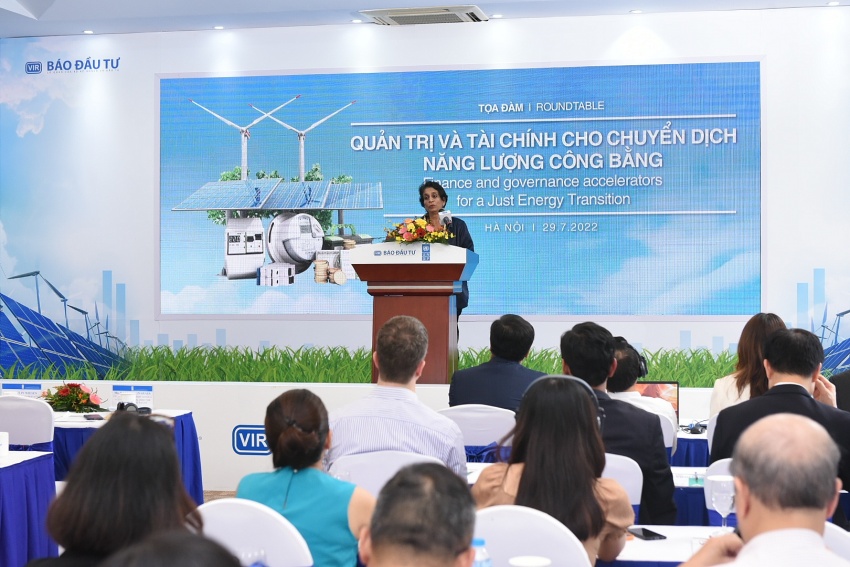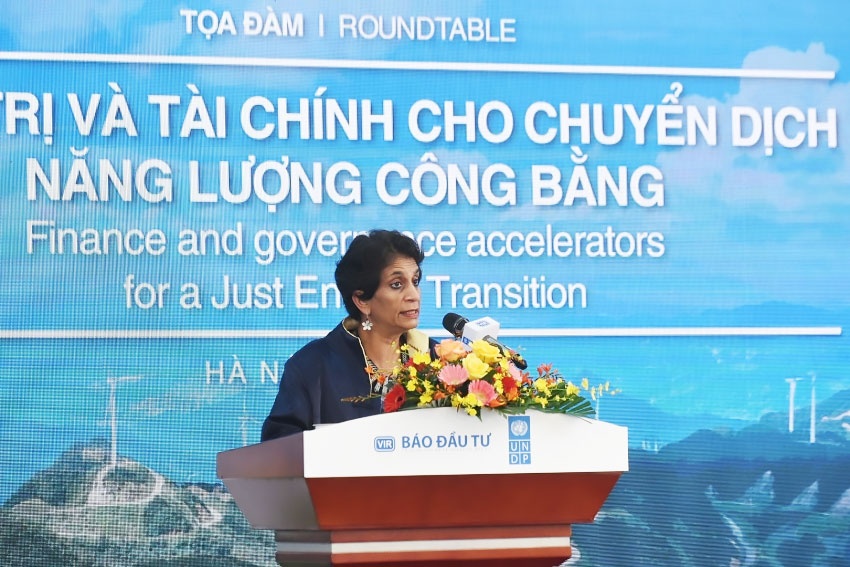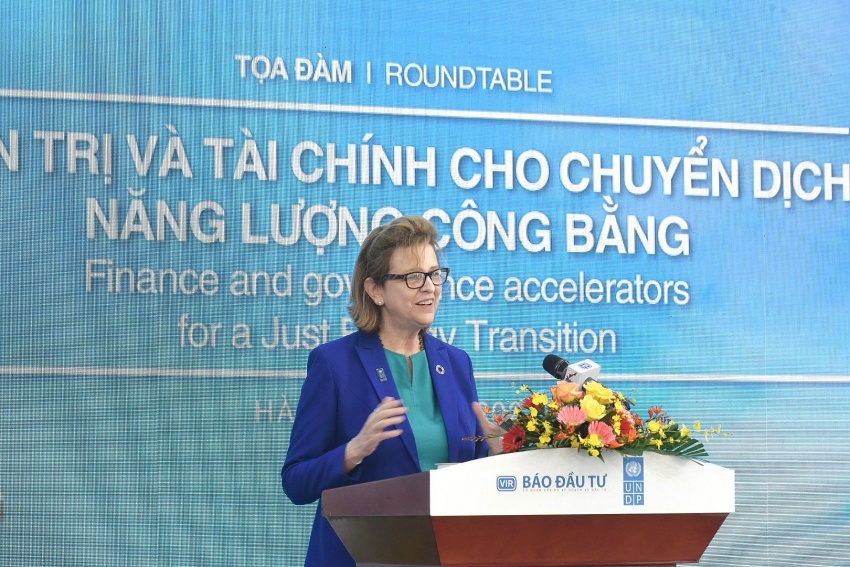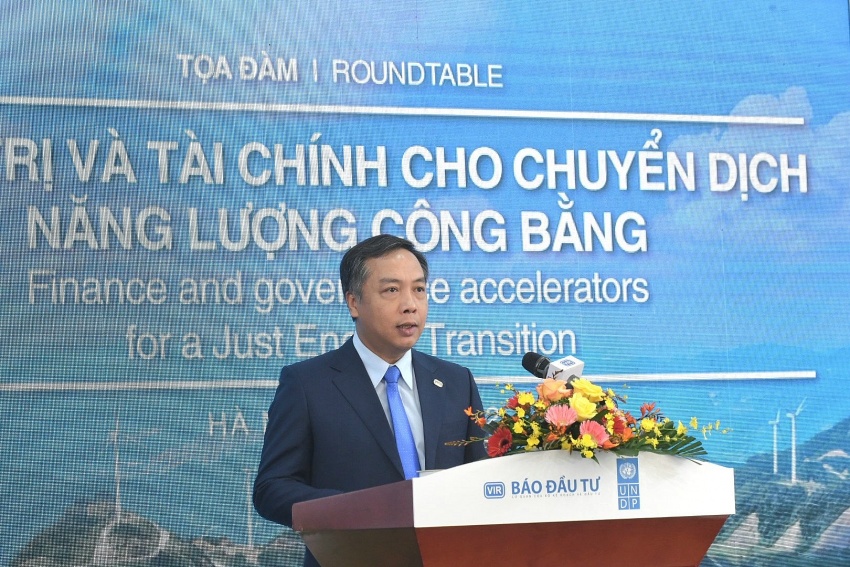Finance and governance accelerators for Just Energy Transition
This was confirmed at the roundtable on Finance and Governance Accelerators for a Just Energy Transition on July 29, co-hosted by the United Nations Development Programme (UNDP) and VIR.
 |
| The roundtable on Finance and Governance Accelerators for a Just Energy Transition |
At the United Nations Climate Change Summit in 2021, the Vietnamese government pledged to achieve net-zero carbon emissions by 2050 while halting investments in new coal power generation, scaling up the deployment of clean power, and phasing out the use of coal by the 2040s.
One of the central challenges facing Vietnam is to meet climate change and energy transition commitments while ensuring that the country maintains its focus on achieving its Sustainable Development Goals, ending poverty, and promoting long-term economic transformation that leaves no one behind.
The session focused on the issue of JET development finance, with an in-depth discussion on the wider context of development financing, the role of domestic and international finance, lessons learnt from international experience, and domestic policy innovations that can support the JET.
Following the opening remarks by UNDP resident representative in Vietnam Caitlin Wiesen and VIR editor-in-chief Le Trong Minh, UN assistant secretary-general and UNDP regional director for Asia-Pacific Kanni Wignaraja – who is on a visit to Vietnam – delivered a keynote address entitled Financing Vietnam’s Transition to Renewable Energy: Beyond the Big Numbers.
 |
| UN assistant secretary-general and UNDP regional director for Asia-Pacific Kanni Wignaraja addressing the roundtable on energy transition |
Policymakers and experts presented recommendations that could help to attract the required finance for energy transition, lessons from Southeast Asia's experience so far, and the role of green public development banks in accelerating climate action.
Pham Xuan Hoe, former deputy director at the Banking Strategy Institute, made a presentation on opportunities and challenges for green finance market development in Vietnam towards sustainable governance and development according to ESG practices.
This was followed by Financing the Energy Transition: The Role of Green Public Development Banks in Accelerating Climate Action – International Experiences and Lessons for Vietnam, jointly by presented Dr. Thomas Marois and Prof. Uli Volz from SOAS University of London.
 |
| UNDP resident representative in Vietnam Caitlin Wiesen addressing the event on energy transition |
The subsequent panel discussion focused on how policies could support private sector participation in the just energy transition.
Finance is a key factor in achieving a just energy transition, with profitability and predictability being vital when financing the JET. The lack of these two factors limits the financing of renewable energy projects, not the other way around.
Governance issues related to competitive and transparent markets, direct (bankable) power purchase agreements, a transparent investment environment, and curtailment, transmission, and distribution issues for power producers play an important role in unlocking finance.
When governance accelerators are in place, financing will come from public investment through taxation, domestic bond issuance, international private finance sources, and domestic private sector financing.
 |
| VIR editor-in-chief Le Trong Minh delivering his remarks at the roundtable |
It is evident that most of the capital needed will be derived from domestic sources. However, national development banks in other countries can provide long-term domestic finance for complex and slow-gestating projects.
Vietnam’s demand for energy will grow rapidly over the coming three decades with transport, industry, agriculture, and construction transitioning from fossil fuels to electricity generated by solar, wind, and other renewable systems. If renewable electricity generation is used to decarbonise the energy system as projected, the demand could increase five-fold by 2050.
In the context that Vietnam both fulfils its climate change and energy transition commitments, and ensures that the country maintains its focus on achieving its Sustainable Development Goals, governance and finance will be effective accelerators for the JET.
This roundtable is the first of a series of discussions, roundtables, and conferences that the UNDP in Vietnam intends to hold in cooperation with the government to clarify the available policy options as it seeks to deepen and develop financial systems.
What the stars mean:
★ Poor ★ ★ Promising ★★★ Good ★★★★ Very good ★★★★★ Exceptional
Related Contents
Latest News
More News
- Trung Nam-Sideros River consortium wins bid for LNG venture (January 30, 2026 | 11:16)
- Vietnam moves towards market-based fuel management with E10 rollout (January 30, 2026 | 11:10)
- Envision Energy, REE Group partner on 128MW wind projects (January 30, 2026 | 10:58)
- Vingroup consults on carbon credits for electric vehicle charging network (January 28, 2026 | 11:04)
- Bac Ai Pumped Storage Hydropower Plant to enter peak construction phase (January 27, 2026 | 08:00)
- ASEAN could scale up sustainable aviation fuel by 2050 (January 24, 2026 | 10:19)
- 64,000 hectares of sea allocated for offshore wind surveys (January 22, 2026 | 20:23)
- EVN secures financing for Quang Trach II LNG power plant (January 17, 2026 | 15:55)
- PC1 teams up with DENZAI on regional wind projects (January 16, 2026 | 21:18)
- Innovation and ESG practices drive green transition in the digital era (January 16, 2026 | 16:51)

 Tag:
Tag:


























 Mobile Version
Mobile Version